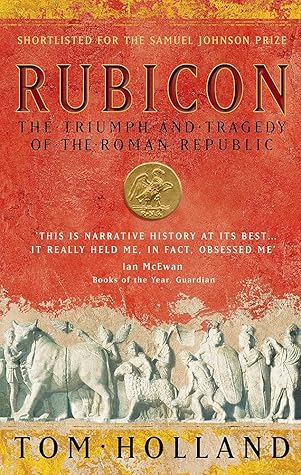More on this book
Community
Kindle Notes & Highlights
by
Tom Holland
Read between
November 16 - December 4, 2020
In the beginning there had been kings, and the last king had been a tyrant. And a man named Brutus had expelled him from the city and set up the consulship, and all the institutions of a free Republic. And now, 465 years later, Brutus, his descendant, had struck down a second tyrant. Leading his fellow conspirators out of Pompey’s great complex, he stumbled and ran in his excitement across the Campus. Holding his bloodstained dagger proudly aloft, he headed for the Forum. There, in the people’s meeting-place, he proclaimed the glad news: Caesar was dead; liberty was restored; the Republic was
...more
With a series of electrifying speeches to the Senate, Cicero sought to rouse his fellow citizens from the torpor of despair, to school them in their deepest ideals, to remind them of what they had been and might be still. ‘Life is not merely a matter of breathing. The slave has no true life. All other nations are capable of enduring servitude – but our city is not.’ Here, in Cicero’s oratory, was a worthy threnody for Roman freedom: both a soaring assertion of the Republic’s heroic past and a rage against the dying of the light. ‘So glorious is it to recover liberty, that it is better to die
...more
Even the gods had blessed the young Caesar with formidable proof of their favour. As Octavian, beneath a cloudless sky, had entered Rome for the first time, a halo in the form of a rainbow had appeared around the sun. Then, three months later, an even more spectacular phenomenon occurred. While Octavian was staging games in honour of his murdered father, a comet had blazed over Rome. It was hailed by the excited spectators as the soul of Caesar ascending to the heavens. Octavian, who privately regarded the comet as a portent of his own greatness, had publicly agreed – as well he might have
...more
Between the rival Caesarian leaders, unchallenged masters now of the entire Western empire, there was to be no war. Instead, on an island in a river near Medina, with their armies lined up on either bank, Antony and Octavian met, embraced and kissed each other’s cheek. Then, along with Lepidus, they settled down to carve up the world and pronounce the Republic dead.
Trapped by his executioners at last, Cicero leaned out from his litter and bared his throat to the sword. This was the gesture of a gladiator, and one he had always admired. Defeated in the greatest and deadliest of all games, he unflinchingly accepted his fate. He died as he would surely have wished: bravely, a martyr to freedom and to freedom of speech.
‘And the word went out everywhere, that Aphrodite had come to feast with Dionysus, for the common good of Asia.’19 No role could have been better designed to tickle Antony’s fancy – no bed-partner either. Just as he had been intended to do, he had speedily made Cleopatra his mistress, and passed a delightful winter with her in Alexandria. Matrons back in Rome would swear by Egyptian methods of birth control, but Cleopatra – at least while taking world leaders to bed – had no time for fiddling around with diaphragms of crocodile dung. As with Caesar, so with Antony, she soon got herself
...more
And then, just when it seemed as though his offensiveness could go no further, came his – and Cleopatra’s – most spectacular stunt of all. In 34 BC the crowds of Alexandria were invited to witness the inauguration of a dazzling new world order. The ceremony was presided over by Antony, Roman triumvir and new Dionysus. By his side sat Cleopatra, Macedonian queen and Egyptian pharaoh, splendidly robed as the new Isis, mistress of the heavens. Before them, arrayed in equally exotic national dress, stood Cleopatra’s children by both Caesar and Antony. To the Alexandrians, these princes and
...more
This highlight has been truncated due to consecutive passage length restrictions.
One year later Octavian closed in for the kill. In July 30 BC his legions appeared before Alexandria. The following evening, as twilight deepened towards midnight, the noise of invisible musicians was heard floating in a procession through the city, then upwards to the stars. ‘And when people reflected on this mystery, they realised that Dionysus, the god whom Antony had always sought to imitate and copy, had abandoned his favourite.’22 The next day Alexandria fell. Antony, botching his suicide in the manner of Cato, died in his lover’s arms. Cleopatra, having discovered that Octavian planned
...more
And then there was one final honour, novel and supreme, as was only fitting. It was decreed that Caesar should henceforward be known as ‘Augustus’.
By becoming ‘Augustus’ he signalled his choice. He would rule not against the grain of the Republic but with it. He would instruct his countrymen in an ancient lesson: that ambition, if not pursued for the general good, might be a crime. And he himself, the ‘best guardian of Romulus’ people’,27 would revitalise the ideals of citizenship so that never again would they over-reach themselves and degenerate into savagery and civil war.
Authority, not office, was what counted: that mysterious quality that had given to Catulus or to Cato his prestige. ‘In all the qualities that make up a man,’ Cicero had once acknowledged, ‘M. Cato was first citizen.’35 ‘First citizen’ – ‘princeps’: Augustus let it be known that he could wish for no prouder title. The son of Julius Caesar was to be regarded as the heir of Cato too.
‘The fruit of too much liberty is slavery’39 had been the mournful judgement of Cicero – and who was to say that his own generation, the last of a free Republic, had not proved it true? But the fruit of slavery? That was for a new generation, and a new age, to prove.


